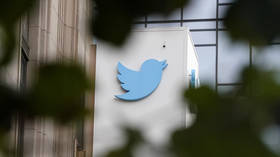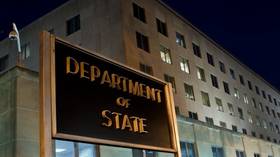Twitter Files expose ‘censorship-industrial complex’ – journalist

Social media platforms colluded with non-governmental organizations and the US government to suppress information they did not like in the name of fighting “disinformation,” journalist Matt Taibbi testified at a congressional hearing on Thursday.
Taibbi appeared alongside Michael Shellenberger, another journalist who has covered the “Twitter Files” for the past several months, before the Select Subcommittee on the Weaponization of the Federal Government, led by Congressman Jim Jordan, a Republican from Ohio.
Taibbi described what he called the “censorship-industrial complex,” calling it “a bureaucracy willing to sacrifice factual truth in service of broader narrative objectives,” and the exact opposite of a free press envisioned in the US Constitution.
Right before his testimony, Taibbi also published a lengthy thread on Twitter, laying out the evidence he entered into the congressional record.
WATCH: @mtaibbi discusses how our own federal government is being turned into an instrument of censorship and social control.#TwitterFilespic.twitter.com/fEd1XpVC6g
— Weaponization Committee (@Weaponization) March 9, 2023
According to Taibbi, Twitter acted “more like a partner” to the government, censoring based on requests it received from federal agencies as well as taxpayer-backed NGOs. Intelligence agencies, dubious “disinformation researchers” and corporate executives effectively worked as a team, he argued.
Taibbi’s thread described an “incestuous self-appointed truth squad moving from law enforcement/intelligence to the private sector and back,” with the same agencies inviting the same “experts” funded by the same foundations and covered by the same reporters to every panel and every conference.
He identified the key players in the censorship-industrial complex as the National Endowment for Democracy, the Atlantic Council’s DFR Lab, and the Alliance for Securing Democracy, authors of the infamous Hamilton 68 dashboard. Many of the NGOs involved received funding from the US government, while legacy media outlets acted as their proxies, demanding censorship.
Taibbi described the Stanford Internet Observatory (SIO) and its “Election Integrity Partnership” – renamed the Virality Project after the 2020 election – as “perhaps the ultimate example of the absolute fusion of state, corporate, and civil society organizations.” By its own admission, it labeled 22 million tweets during the 2020 election campaign, and was then given access to Twitter’s JIRA ticketing system, which is able to tackle 50 million tweets a day.
SIO is run by Renee DiResta, who helped design Hamilton68 and worked at New Knowledge – a group caught creating fake “Russian bots” to help Democrats in the 2017 Alabama special election for the US Senate. The scandal did not stop them from advising the Senate Intelligence Committee on “Russian interference” in US elections, preventing US legacy media from questioning any of their conclusions.
“Packaged as a bulwark against lies and falsehood, [the CIC] is itself often a major source of disinformation, with American taxpayers funding their own estrangement from reality,” Taibbi wrote. “Without real oversight mechanisms, there is nothing to prevent these super-empowered information vanguards from bending the truth for their own ends.”
During the hearing, multiple Democrats tried to pressure Taibbi into revealing his sources, insinuating Twitter’s new owner, Elon Musk, was behind the disclosures.
“I’m not his source, but, yeah, obviously asking journalists to reveal sources is not cool,” Musk tweeted on Thursday afternoon, in response to the hearing.














